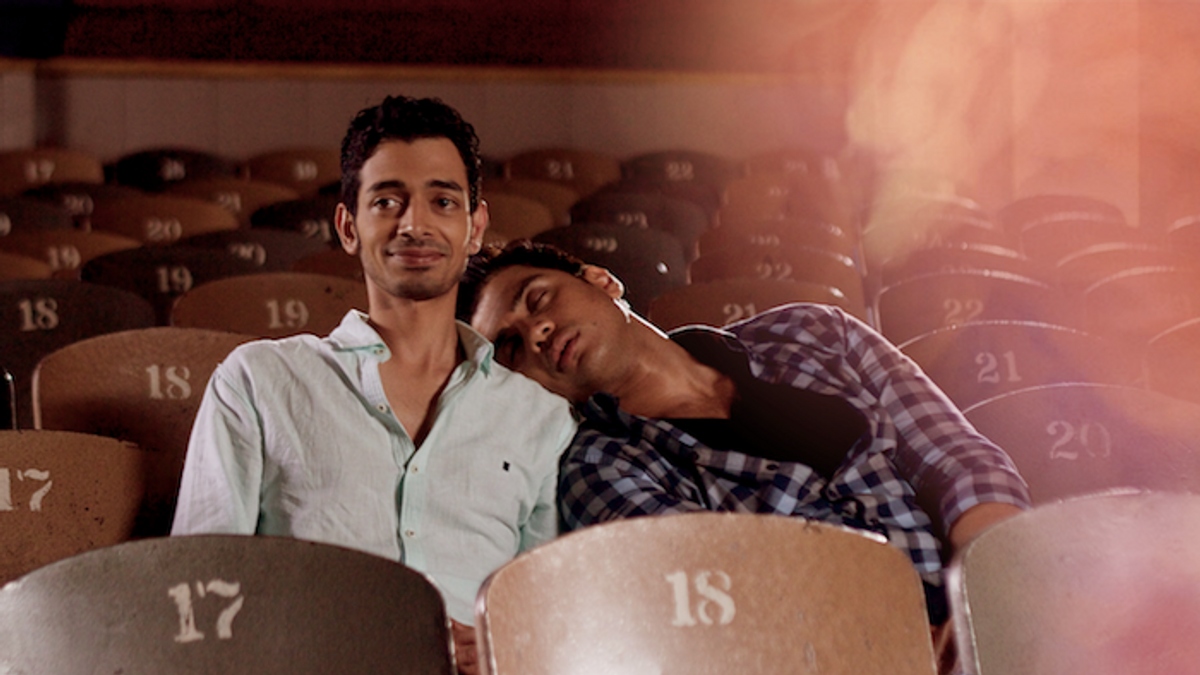Movies
This Queer Indian Film Wants to Start a Nuanced Conversation About Rape

Director Sudhanshu Saria's Loev examines the nuances of romantic tension.
May 04 2017 2:44 PM EST
May 01 2018 11:46 PM EST
MikelleStreet
By continuing to use our site, you agree to our Private Policy and Terms of Use.

Director Sudhanshu Saria's Loev examines the nuances of romantic tension.
Warning: This post may contain spoilers
Sexual tension pervades Loev, the 95-minute film set in India that debuted this week on Netflix tracing a weekend long road trip of two old friends. In defiance of the Indian Penal code Section 377, which effectively criminalizes homosexuality, the film depicts the relationship between a trio of boyfriends and lovers.
And though the film features only one woman, director Sudhanshu Saria finds that because of its intricacies, women can discover a deeper connection to Loev than even some of the gay men watching.
"India is the capital of marital rape" Saria told OUT. "So in screenings, women connect and react way more strongly than men do." In particular, a moment of connection comes at what could be considered the film's climax: the feature's two main characters, Jai and Sahil, are fighting in a moment that turns to intercourse.
"I wanted to tread the line," Saria said of the scene which was filmed multiple times, all in 17-minute takes with no cuts. "I wanted those who wanted to see it as rape to be able to find that evidence in it, for those who didn't want to, they could find that evidence in it, and those who wanted to see it as a kind or an excuse for infidelity, could find that evidence."
The scene took up two of the entire project's 16 days of filming, and while both pivotal and conflicting, it was nuanced, as is life.
According to a 2014 study, 38 percent of rape victims are male. That statistic was brought to the surface in a new documentary, The Voiceless, by Vanessa McNeal, as well as with Zeke Thomas's story about being a victim of date rape. But for the viewers of Loev, the occurrence is a bit of subterfuge; you want a payoff for all of the sexual tension that's accrued throughout the film, but this is not how you wanted it.
"I didn't want to make a movie where you knew what happened, where you knew who was at fault, where you knew who screwed up," Saria said. That sort of clear-cut, "good guy, bad guy; this was right, this was wrong," scene isn't reflective of how life operates, which is frequently in the greys of the world, more so than the black and white.
"There were takes where [Jai] was too aggressive, where he wasn't aggressive enough, where Sahil pushed back too much where he didn't push back enough," Saria said. "I wanted to make sure there was enough that you could forgive him, enough that you couldn't. I'm only in it for discussion, not approval." But viewers had differing opinions on how he should have handled the situation.
Increasingly, in large part due to social media, there has become only one way to talk about certain issues. Instead of a plurality of voices and thoughts, instead of conversation, there are to be edicts, mantras repeated over and over, typically lacking nuance and often glazing over the intricacies of individual circumstances.
"It became clear they wanted me to say out loud, 'Rape is bad,' and it's like, 'Really? Yes, rape is bad,'" Saria said. "But what is the need to make the movie that says this guy is an asshole and this guy is a victim? What's the need?"
Instead, Saria finds a need to portray situations that are not as cut and dry in order to spark conversations about those--a discussion wherein even the participants may still be unclear about what occurred.
And as real life victims frequently find themselves in that exact situation, isn't there a need for that?
Mikelle is the former editorial director of digital for PrideMedia, guiding digital editorial and social across Out, The Advocate, Pride.com, Out Traveler, and Plus. After starting as a freelancer for Out in 2013, he joined the staff as Senior Editor working across print and digital in 2018. In early 2021 he became Out's digital director, marking a pivot to content that centered queer and trans stories and figures, exclusively. In September 2021, he was promoted to editorial director of PrideMedia. He has written cover stories on Ricky Martin, Miss Fame, Nyle DiMarco, Jeremy O. Harris, Law Roach, and Symone.
Mikelle is the former editorial director of digital for PrideMedia, guiding digital editorial and social across Out, The Advocate, Pride.com, Out Traveler, and Plus. After starting as a freelancer for Out in 2013, he joined the staff as Senior Editor working across print and digital in 2018. In early 2021 he became Out's digital director, marking a pivot to content that centered queer and trans stories and figures, exclusively. In September 2021, he was promoted to editorial director of PrideMedia. He has written cover stories on Ricky Martin, Miss Fame, Nyle DiMarco, Jeremy O. Harris, Law Roach, and Symone.
Beware of the Straightors: 'The Traitors' bros vs. the women and gays